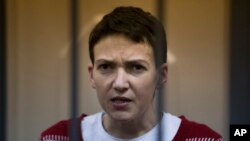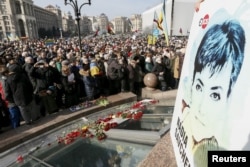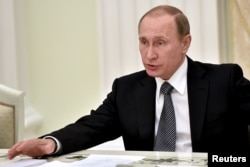The Ukrainian pilot whose 22-year prison sentence by a Russian court last month was widely criticized as a farce is now carrying out a "dry hunger strike" to protest her detention.
Lawyers for Nadezhda Savchenko said their client had taken no food or water since her conviction formally went into effect one week ago. They said she agreed Tuesday only to a glucose drip following warnings from doctors of possible blood clots or heart stoppage.
Savchenko's hunger strike follows her conviction on charges of complicity in the slaying of two Russian journalists covering the war in east Ukraine. The Ukrainian has denied involvement in the reporters' deaths but also refused to appeal the Russian court's decision — in essence forcing a life-or-death game with the Kremlin to try to secure her release.
“She doesn’t want to die … it’s a form of protest,” her attorney Mark Feygan told VOA. “But the hunger strike is a already direct threat to her life.”
'Complicated game'
Meanwhile, what Feygan calls a “complicated game” over Savchenko’s fate is playing out among Moscow, Kyiv, and Western powers behind the scenes.
Negotiations were apparent in the days following Savchenko’s conviction. Ukrainian President Petro Poroshenko called on his Russian counterpart, Vladimir Putin, to engage in a straight prisoner swap: Savchenko for two Russian soldiers captured while fighting in east Ukraine.
The deal went nowhere over insistences from Moscow that it was not a participant in the Ukraine conflict.
Vladimir Frolov, a foreign policy analyst with Slon.ru, told VOA that Petroshenko seemed to have misread the moment.
"For the Kremlin, Savchenko is a headache," Frolov said. "But she's also a bargaining chip."
Soldier as symbol
The Savchenko saga has captivated audiences on both sides of the Ukrainian conflict and beyond.
For Russians, Savchenko is touted as the Ukrainian face of what the Kremlin has branded a "fascist junta" that came to power after street protests demanding closer ties to Europe toppled Ukraine's pro-Moscow government in 2014. A poll following the trial found a majority of Russians supported Savchenko's conviction wholeheartedly.
But for Ukrainians, Savchenko has emerged a symbol of defiance to the Kremlin's annexation of the Crimean Peninsula and ongoing proxy war through support of pro-Russian rebels in east Ukraine. Savchenko's fame at home has only soared further as a result of her detention: During her trial, she was both elected to the Ukrainian parliament and appointed a Ukrainian delegate to the Council of Europe in absentia.
The growing symbolism of the case has gradually pulled in leaders from the United States and Europe, who have joined in calling for Savchenko's release.
President Barack Obama personally appealed for Savchenko's release during recent talks with Putin. So, too, did Secretary of State John Kerry during a visit to Moscow late last month. Neither was able to strike a deal.
Bartering for freedom
The back-and-forth negotiations over Savchenko's release have fueled speculation occasionally reminiscent of Cold War spy swaps, with observers weighing in on what the Kremlin wants in return.
Feygan told VOA he suspected the Russian president was holding out for one deal in particular.
“Putin wants an end to European sanctions imposed over Russia’s actions in Ukraine,” said Feygan, suggesting a Savchenko deal would have to wait until June, when the EU votes next on whether to extend the measure.
But analyst Vladimir Frolov argued that the Kremlin was merely sifting through a range of collateral bargains.
A blanket amnesty for separatists captured fighting in east Ukraine? Savchenko in exchange for Kyiv granting greater autonomy to east Ukraine as promised under the stalled Minsk peace accords? Those and other deals, noted Frolov, could serve Moscow’s wider interests and lead to an end to sanctions, with one caveat.
“Moscow prefers to work in “superpower parity” mode,” he said, working with the U.S. and European powers, rather than Ukraine, in resolving the Savchenko issue.
Savchenko sanctions
International pressure over the Savchenko case took another step forward Wednesday as Lithuania followed Ukraine in issuing a formal “Savchenko List” of 46 Russian and Ukrainian figures banned from travel to Lithuania over the pilot’s imprisonment. Lithuanian officials said they would push fellow EU members to adopt the measure as well.
In an interview with VOA, Savchenko's sister, Vera Savchenko, said she was certain that growing pressure from outside parties would make it "merely a question of the date" of her sister's release.
"The whole world has told Putin how they'll react if he doesn't release [my sister]," she said.
For his part, the Russian president may have his chance to weigh in on the Savchenko issue this week when he addresses the nation during his annual “Primaya Linia / Direct Line” marathon question-and-answer session with the Russian public.
The event is widely viewed as a scripted opportunity for the Russian leader — with room for occasional improvisation.
In a post to Facebook, another of Savchenko’s attorneys, Nikolai Polozov, said his client was aware of the event and was calling on journalists to challenge Putin directly.
“Don’t ask, ‘Will he or won’t he let her go?' ” wrote Polozov, in speaking for Savchenko. “Ask when President Putin will return her home to Ukraine.”











